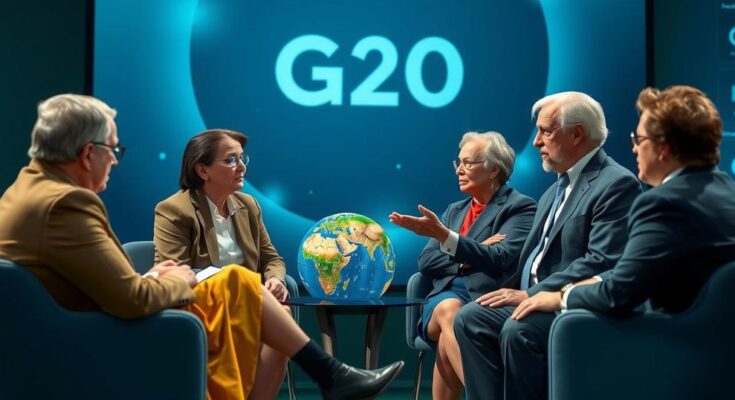The G20 summit in Brazil focuses on the climate crisis, coinciding with UN Cop29 discussions on climate finance. Leaders aim to reach an agreement on financing goals, with calls for developed nations to provide substantial support to developing countries. Tensions arise as countries debate equitable contributions. Brazil’s “Mission 1.5” targets limiting warming to 1.5°C, stressing the urgent need for actionable financing agreements to combat climate change effectively.
As the G20 summit convenes in Brazil, the climate crisis emerges as a pivotal topic, particularly against the backdrop of the ongoing UN Cop29 climate discussions in Baku, Azerbaijan. The leaders of the world’s largest economies aim to address pressing global issues, including poverty, hunger, and institutional reforms. However, the necessity for substantial climate finance remains paramount, with G20 nations responsible for 85% of the global economy and over three-quarters of greenhouse gas emissions. UN Secretary General Antonio Guterres emphasized, “All countries must do their part. But the G20 must lead,” citing their significant role in global emissions and climate finance. Despite calls for action, tensions persist within the negotiations, as developing nations pressure wealthier countries to contribute their fair share, especially amidst the backdrop of potential shifts in U.S. climate policy with President-elect Donald Trump’s return. During the summit, discussions of a joint G20 statement have faced challenges regarding equitable contributions toward climate finance, highlighting the ongoing need for a unified approach to meet the ambitious $1 trillion targeted for climate funding directed towards developing nations. Brazil’s strategy for the forthcoming Cop30 summit next year will revolve around “Mission 1.5,” a crucial objective aimed at limiting global warming to 1.5°C. For significant progress in addressing climate change, the G20’s role in financing and global cooperation is indispensable. Without meeting these financial commitments, the anticipated successes of both Cop29 and future gatherings could face considerable obstacles, representing a critical juncture in the international climate agenda.
The G20 summit gathers leaders from the largest economies to address global challenges, including climate change, which is increasingly recognized as an urgent and pressing issue. The summit coincides with the UN Cop29 discussions, which are aimed at establishing critical climate financing goals. With G20 nations significantly contributing to emissions and economic resources, the expectation is for them to take a leading role in addressing climate-related financial needs. Particularly, developing countries are advocating for greater support from wealthier nations, underscoring the importance of collaborative efforts in mitigating climate change effects.
In conclusion, the G20 summit in Brazil is positioned as a crucial platform for addressing the climate crisis amid ongoing tensions related to climate finance. The necessity for the world’s largest economies to lead in emissions reduction and financial contributions is clear, especially as upcoming climate goals require a concerted effort. Achieving a breakthrough in negotiations will be vital not only for Cop29 but also for future climate summits, impacting global strategies toward limiting temperature rise and fostering sustainable development.
Original Source: www.rfi.fr




